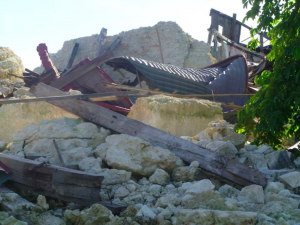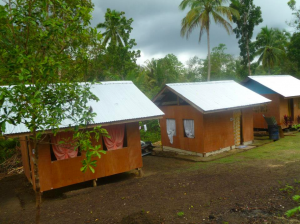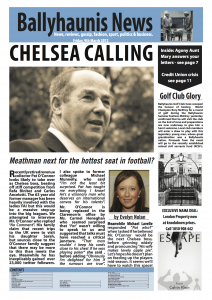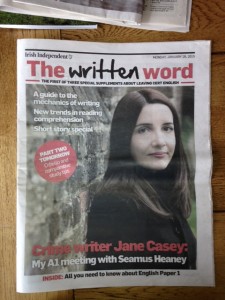Let me tell you a little story.
It’s the story of an earthquake. It’s a story of poetry and justice and community. Oddly, it’s also the story of how I got published in a book in the Philippines.
When an earthquake struck the Bohol province on the 15th October 2013, perhaps I was fleetingly aware. It may have registered briefly in my consciousness even as it registered 7.2 on the richter scale, killing 200 people, displacing 380,000 and leaving 75,000 without homes.
What do you do in the face of such devastation?
If you live far away, untouched, relatively unaware, probably nothing. Perhaps you donate a few euros to Concern or the Red Cross. Perhaps you don’t. The news flits in and out of your consciousness. Another natural disaster takes its place. Occasionally a friend will be fundraising to go build houses somewhere houses need building (India? Africa? the Phillipines?) and you mindlessly throw ten euros their way. Of course you’ll help. Worthy cause. It costs you nothing in the big scheme of your life. You will not miss the money.
But then one day, you get a message from a retired teacher, Milwida Reys. She grew up in the Phillipines and though she spent most of her adult life teaching English in Sydney, her heart is still at home, at home with the earthquake victims as they struggle to rebuild their lives from the ruins. Her childhood friend, Nestor Pestelos, has been fundraising to build 150 houses for the earthquake victims most in need, families with disabled or elderly members, families who will spend years living in tents if something is not done to help them. Entire communities come together, provide salvaged materials and labour, take the process of rebuilding their homes into their own hands; all, of course, with much needed financial assistance and guidance from the Bohol Quake Assistance fund.
But why is Miwilda emailing an English teacher in Ireland who lives half way across the globe and who she’s never met?
Well, Nestor is not only a leader and visionary in community development. He’s also a poet. His friends and colleagues recognise the beauty of his writing even as they appreciate that many years ago he put his first love, writing, to one side, to focus on his other passions: community and justice. At 72, he is showing no signs of slowing down, despite occasional mumblings about retiring so that he can write more.
Now, these two passions – poetry and community – have come together is an altogether unexpected way. Mrs Corazon Verzosa Lanuza, who attended the same high school as Nestor and is a former student of Milwida’s, has made a significant donation to the Bohol Quake Assistance fund, but she has also made a request. She has requested that some of this money be used to publish a school edition of Nestor’s poetry collection “Old Warrior and other poems” so that the students who now attend their alma mater can read and appreciate the poetry of this man who once roamed the same corridors they now roam; who encountered poetry just as they encounter it now at school.
In fact, the vision for the project grows and expands as other people become involved. What about including some of the poems in translation, so that those students whose English lags behind their native tongues of Tagalog and Visayan, can still access their beauty and their message? What about including a guide to studying poetry, so that reading and appreciating poetry becomes a more accessible, less elite activity? Why not also tell the story of the earthquake and the assistance fund? Couldn’t this book inspire young people to consider development work as a legitimate future, one which is quite different from the usual self-centered pursuit of career and self-fulfillment?
And so, an idea was born. Milwida, living in Australia but desperate to help, was given the task, alongside Nestor, of putting the book together. She had the original book of poems. Nestor could tell the Bohol Quake Assistance story, in between project meetings and fundraising and liasing with volunteers and contributors. Perhaps she could gather some responses to his poetry and some poems in translation? Now she needed a poetry study guide. And when she googled poetic techniques, from all the way across the globe, up popped little old me.
Milwida’s request was characteristically humble:
“My main reason for trying to contact you was to ask your permission to reproduce ‘Poetic techniques & terminology’ from leavingcertenglish.net. Is ‘Poetic techniques & terminology’ for the exclusive use of your students? Is it possible for Filipino students to access it, too? Not many schools in the Philippines are equipped with a computer system similar to that in schools in the West. Students cannot search information online as easily…
I’m helping Nestor Maniebo Pestelos, a friend since high school, promote his self-published book of poems, Old Warrior and Other Poems as a supplementary material to teach high school literature in my home country. The book would be even more invaluable if your ‘Poetic Techniques & Terminology’ could be included as a Study Guide when the Second Edition is printed”.
And that is how I came, one morning not too long ago, to greet the postman as he handed me a package all the way from the Philippines. That is how I came, for only the second time in my life, to hold in my hands a book in which my writing was published, the thrill altogether different to that of publishing online. That is how I came to read Nestor Pestelos’ beautiful poems and the Bohol Quake Assistance story and to feel the earthquake register in my consciousness in a way it never had before.
I don’t know what the moral of this story is.
It may have something to do with the remarkable way in which we are all now connected online in this incredible global village.
It may have something to do with the capacity some remarkable human beings possess to always look beyond the self. For Nestor, ‘Art, relative to life, can always wait’ which is why, rather than retire, he has responded to a summons to work for the next 6 months on a UNICEF project in Samar to assist those hardest hit by last year’s super typhoon.
It may, conversely, have something to do with how difficult it is for a tragedy that does not touch our lives to touch our hearts. This is perhaps the hardest thing of all for me to digest. How, without that random google search leading somehow to me, this earthquake would have remained nothing more than a barely registered event in the myriad of human and natural disasters that rain down on our TV screens night after night. Numbed by over exposure, how do we retain the capacity to care?
—
For more about the work being done in Bohol, take a look at http://bohollocaldev.org/









